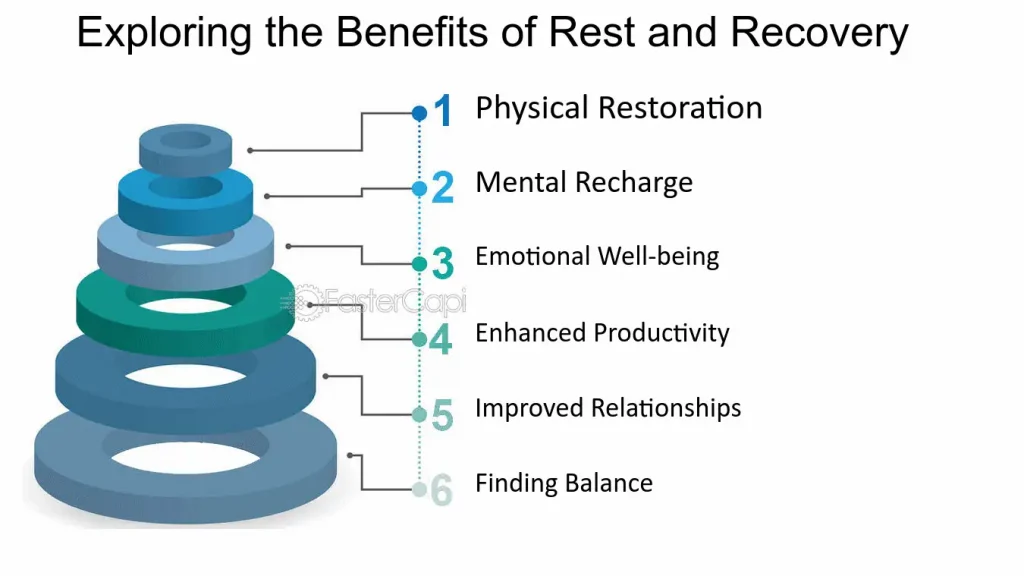In today’s fast-paced world, where hustle culture glorifies constant productivity and achievement, the concept of rest and recovery often takes a backseat. We’re encouraged to push harder, work longer hours, and sacrifice sleep in pursuit of our goals. However, what many fail to realize is that rest and recovery are not signs of weakness but essential pillars of success and well-being.
Understanding Rest and Recovery:

Rest and recovery encompass more than just sleep. It involves allowing our bodies and minds time to recuperate, recharge, and repair from the demands of daily life, including physical activity, stress, and mental exertion. It’s about finding balance in our lives and recognizing the importance of downtime for our overall health and performance.
Physical Benefits of Rest and Recovery:

- Muscle Repair and Growth: Rest allows our muscles to repair and rebuild stronger after exercise, leading to gains in strength, endurance, and performance.
- Injury Prevention: Adequate rest reduces the risk of overuse injuries by giving our bodies time to recover and heal from the stresses of physical activity.
- Immune Function: Sleep and rest play a crucial role in supporting our immune system, helping to fend off illness and infection and keeping us healthy and resilient.
Mental and Emotional Benefits:

- Stress Reduction: Rest and relaxation help to lower cortisol levels and reduce stress, promoting a sense of calm and well-being.
- Improved Cognitive Function: Quality sleep and downtime enhance cognitive function, memory consolidation, and problem-solving skills, allowing us to think more clearly and creatively.
- Enhanced Mood: Restorative rest boosts mood and emotional resilience, helping us to better cope with challenges and maintain a positive outlook on life.
The Pitfalls of Ignoring Rest and Recovery:

In our relentless pursuit of success, it’s easy to overlook the importance of rest and recovery. However, neglecting these vital aspects of self-care can have serious consequences for our health, well-being, and performance.
- Increased Risk of Burnout: Overworking without adequate rest can lead to burnout, a state of physical, mental, and emotional exhaustion characterized by decreased motivation, productivity, and overall satisfaction.
- Impaired Performance: Without proper rest, our bodies and minds cannot perform at their best. We may experience decreased energy, focus, and concentration, hindering our ability to perform effectively in work, school, or sports.
- Compromised Health: Chronic sleep deprivation and stress weaken the immune system, increase the risk of chronic diseases such as heart disease and diabetes, and negatively impact overall health and longevity.
Incorporating Rest and Recovery into Your Routine:
Making rest and recovery a priority doesn’t mean slacking off or being lazy. It’s about working smarter, not harder, and recognizing that downtime is just as important as active time. Here are some tips for incorporating rest and recovery into your routine:

- Prioritize Sleep: Aim for 7-9 hours of quality sleep per night to allow your body and mind to rest and rejuvenate.
- Schedule Downtime: Carve out time in your schedule for relaxation activities such as reading, meditating, or spending time in nature.
- Listen to Your Body: Pay attention to signs of fatigue, stress, and overtraining, and give yourself permission to rest when needed.
- Practice Self-Care: Take care of your physical and emotional well-being by engaging in activities that bring you joy, such as hobbies, socializing, or pampering yourself.
- Recovery Strategies: Incorporate recovery strategies such as stretching, foam rolling, massage, and hydration to support muscle recovery and reduce soreness.
Conclusion:
Rest and recovery are not signs of weakness but essential components of a healthy, balanced, and successful life. By prioritizing rest and recovery, we can enhance our physical health, mental well-being, and overall performance, allowing us to unlock our full potential and thrive in all areas of life. Remember, it’s not about how hard you work but how well you recover that ultimately determines your success and happiness.